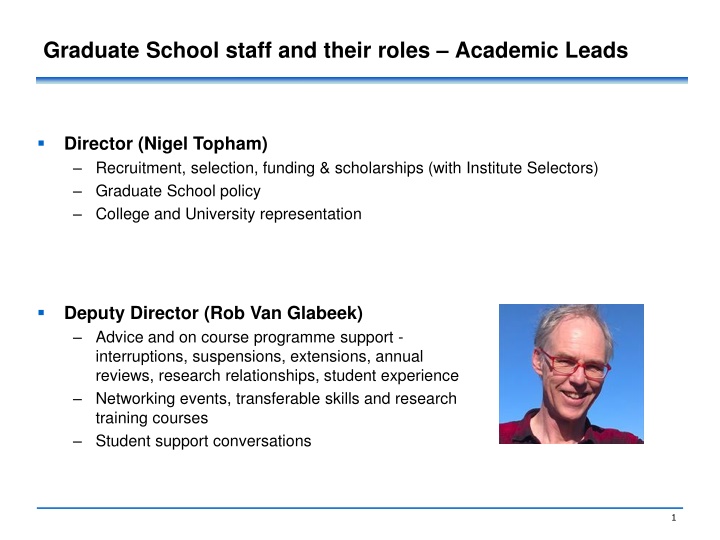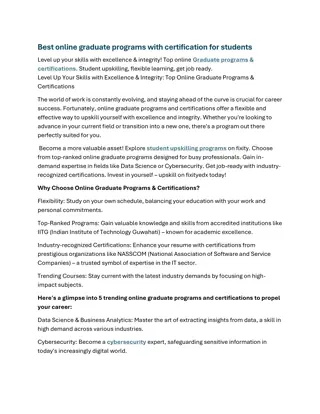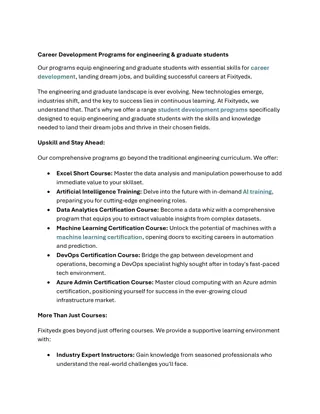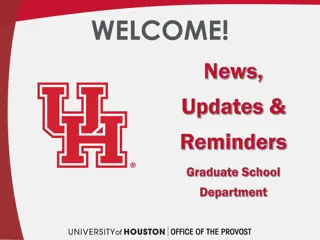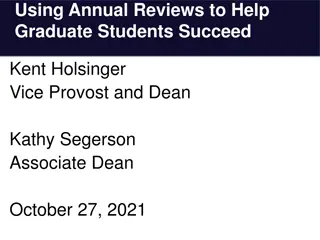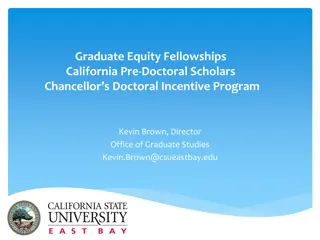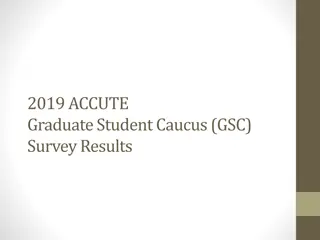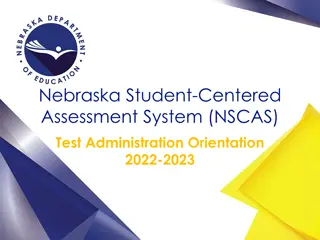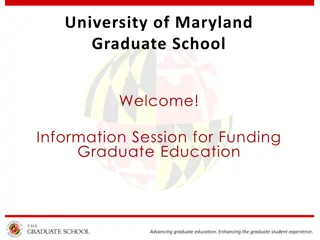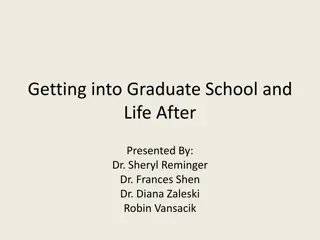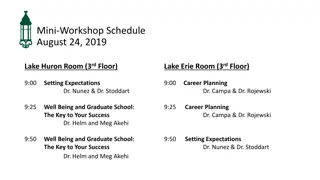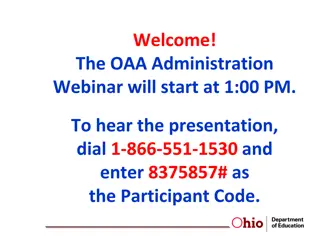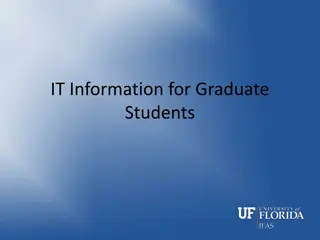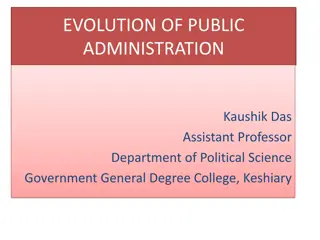Roles and Support Services in Graduate School Administration
The Graduate School staff play various key roles such as academic leadership, recruitment, funding, and policy development. They provide support for students in areas like interruptions, suspensions, and research training. Personal tutors offer additional academic guidance and can address difficulties outside normal supervision channels. The IGS admin team manages policies, finances, and admissions. Academic training programs like "Getting Started with Postgraduate Research" help new students navigate their academic journey effectively.
Download Presentation

Please find below an Image/Link to download the presentation.
The content on the website is provided AS IS for your information and personal use only. It may not be sold, licensed, or shared on other websites without obtaining consent from the author.If you encounter any issues during the download, it is possible that the publisher has removed the file from their server.
You are allowed to download the files provided on this website for personal or commercial use, subject to the condition that they are used lawfully. All files are the property of their respective owners.
The content on the website is provided AS IS for your information and personal use only. It may not be sold, licensed, or shared on other websites without obtaining consent from the author.
E N D
Presentation Transcript
Graduate School staff and their roles Academic Leads Director (Nigel Topham) Recruitment, selection, funding & scholarships (with Institute Selectors) Graduate School policy College and University representation Deputy Director (Rob Van Glabeek) Advice and on course programme support - interruptions, suspensions, extensions, annual reviews, research relationships, student experience Networking events, transferable skills and research training courses Student support conversations 1
Graduate School staff and their roles - PGR Personal Tutors For all MScR and PhD students, we have PGR tutors - John Longley, Murray Cole and Elizabeth Polgreen Independent academic advisors who can be consulted in case of difficulties that cannot be resolved through normal supervisory mechanism Can offer advice on certain issues that students may not want / be able to discuss with their supervisor Liaison with the Deputy Director of the Informatics Graduate School (Rob) Students may request a consultation with either male or female Personal Tutor if they have a gender preference The CDTs have specific pastoral support tutors (Bjorn Ross for NLP, Michael Herrmann for RAS, Ian Simpson and Diego Oyarzun for Biomed-AI). Tutors may provide direct support or signpost students to various forms of non-academic support, such as the wellbeing centre/advisors, student counselling service, disability service. 2
Graduate School staff and their roles IGS admin team Lindsey Fox (Manager) Team management Policy, procedure, regulations Finances/budgets Located on level 3 Office 3.42 Agapi Stylianidou and Kat Deuchars La Fleur Admissions and pre-arrival support Drop in between Patrick Hudson and Jonathan McBride on course programme support (programme changes, concessions, student wellbeing support (including SoA support) Socials and community building estates management (desks / office admin) 09.30-12.30 2 4pm Email igs@inf.ed.ac.uk Agapi Stylianidou and Margaret Blake Stipend payments and funding admin 3
Academic Training and Support Getting Started with Postgraduate Research Course A three week online course for all new PGR students Next course will run from 16 Oct 2023 (3 x sessions across 3 weeks) Structure: Week 1: Getting to know you and starting out this is to introduce you to the course and other participants and to cover the essential information and expectations Week 2: Focus on achieving the first milestones identifying milestones, planning and skills development, the supervisory relationship Week 3: Overcoming common challenges identifying challenges, tips and strategies to overcome BOOK ONLINE https://www.ed.ac.uk/institute-academic- development/postgraduate/doctoral/courses/getting-started-postgraduate-research 4
Academic Training and Support A dedicated academic service providing tailored support and opportunities for UG, Masters and Doctoral students, and for early career researchers and staff involved in teaching, learning and research. They provide support to help you identify and gain skills needed to successfully complete your research degree But they also support doctoral researchers by focusing on the researcher beyond the research degree They provide information and support to help you take responsibility for your own professional and skills development. A great place to start (and revisit) is the VITAE Research Development Planner . 5
Academic Training and Support Use the Vitae Researcher Development Framework (RDF) to help you: explore all the aspects of being a researcher identify your strengths prioritise areas for professional development write a plan, then monitor progress and success have productive discussions with others, e.g. your supervisor, careers advisor etc look for formal and informal development opportunities prepare for one-to-one progress reviews, appraisals or career development conversations with your research manager or mentor. REVIEW REGULARLY / ANNUALLY 6
Academic Training and Support The IAD offers a large number of (in person and online) training workshops linked to the RDF planner Domain A Good Practice in Research Data Management Viva Survivor Designing effective conference posters Domain B Managing your research project Practical project management Public speaking, networking and engaging Presenting with ease Writing retreats Domain C How to be an effective researcher Research Ethics and Integrity (compulsory for UKRI funded students) Domain D Writing for publication Social media for research and impact Public engagement beyond lectures 7
Academic Training and Support Also dedicated courses for those who are interested in Tutoring and Demonstrating to supplement income and an interest in academic teaching BOOK ONLINE https://www.ed.ac.uk/institute-academic-development/postgraduate/doctoral/courses 8
In case of problems https://web.inf.ed.ac.uk/infweb/student-services/igs/phd/resolving-problems Points of contact depend on the kind of issue (and who it may involve) 1. Your Principal Supervisor Normal Point of Contact for Academic Issues . 2. Your Assistant Supervisor(s) 3. Your Institute or CDT Director, or CDT tutor Degree Programme Issues . 4. Head of Graduate School Nigel Topham Admissions or Studentship Issues . 5. Personal Tutors for Research Students John Longley Murray Cole Elizabeth Polgreen Any Other Issues . 6. Deputy Director of Graduate School Rob Van Glabeek 7. Head of School (Helen Hastie) Escalating Unresolved Issues . 8. College Dean of PGR Students (Anthony Maciocia) Normal points of contact are for general guidance If you have a sensitive issue to discuss you can contact any of the above, but we recommend talking first to Deputy Head of Graduate School or a Personal Tutor 9
University Central Services Health and Wellbeing Service University NHS GP practice / pharmacy in Bristo Square The University Counselling Service Supporting the mental health of students, using short- term counselling (face to face and email). You can "self-refer" and priority is early intervention. Drop-in sessions and lifelong learning Referral to other services Self-help links and links to online apps Big White Wall Free access to the Feeling Good App Silver cloud (online mental health treatments/CBT) Crisis support University Disability Service Needs assessments and schedule of adjustments University Libraries The Advice Place (EUSA) They provide advice to students on everything from getting grades appealed, dealing with landlord issues, to managing personal issues and much more. Careers service The Wellbeing Centre houses the Student Counselling and Disability Services, the University Medical Centre and the University Pharmacy. 10
Programme Concessions There are a range of concessions and leave entitlements for PGR students: Leave of Absences any study needing to be undertaken off-campus requires you to apply for an LoA. Interruptions student can apply for an Interruption from their programme of study if / when a break might be required. Changing programme (rare) but it is possible to change your programme of study to a lower / exit degree if it is appropriate. Extensions possible, but only with good reason/justification and with support of supervisor and the IGS (approval is not guaranteed / an automatic right) 11
PGR Leave Entitlements Leave Entitlements Annual leave, compassionate leave, sick leave, parental leave Annual leave - 40 days for all FT students (pro rata for PT students), which includes the days students must take over Christmas closure period (NB: CDT students must not take AL during the teaching semesters) Compassionate leave students funded by a studentship administered by the Uni/School are entitled to 5 days compassionate leave in any rolling 12 month period; clear application process on IGS webpages. Sick leave students funded by a studentship administered by the Uni/School are entitled to 3 months sick pay in any rolling 12 month period; clear application process on IGS webpages, must be support by a Fit Note from your GP if sickness absence >7 days. Parental leave - students funded by a studentship administered by the Uni/School are entitled to paid maternity, paternity and/or adoption leave (in line with statutory provisions). 12
Words of wisdom Expect the unexpected; plans and opportunities change. Be adaptable and resilient. Adopt to changing situations and be prepared to bounce back. Look after yourself and your mental wellbeing. Ask for help as soon as you need it; don t delay as being happy and healthy is integral to excelling in your research and being a productive/successful researcher. 13
